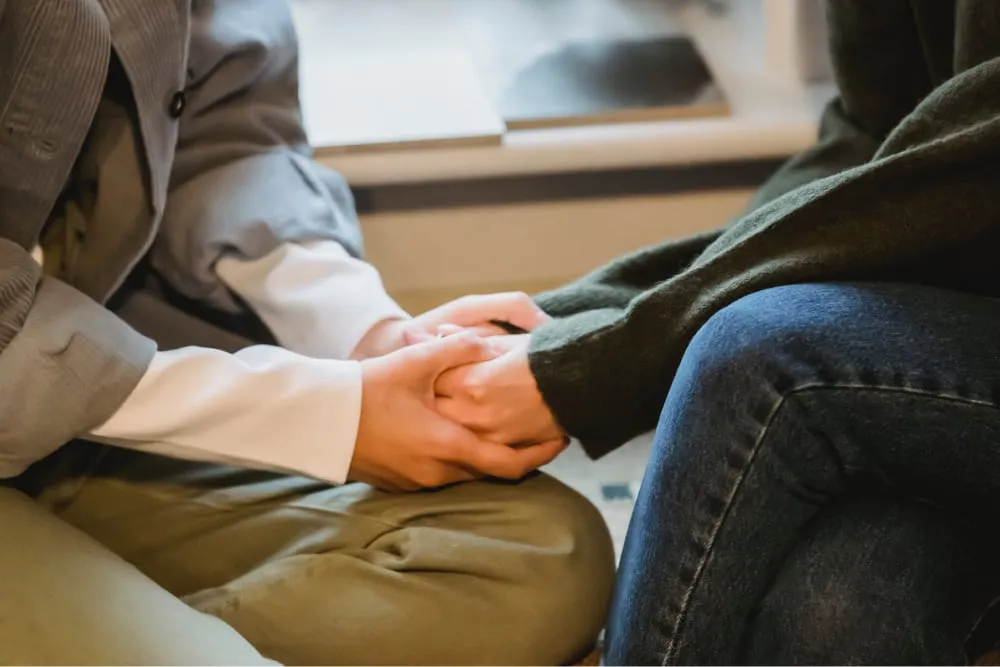Educate yourself
They say that knowledge is power, and it can be an especially formidable tool when it comes to dealing with something as complex as an eating disorder.
The benefits of educating yourself on bulimia nervosa are twofold: it can help you better understand the disorder, which can help you better understand what your loved one is going through; and it can help you learn more about what else you can do to support someone with bulimia.
Get familiar with signs and symptoms
Eating disorders are among some of the most widely misunderstood mental illnesses. People often think they’re a choice, a vain play for attention, or just a phase. Many people also think they can tell who has an eating disorder based on weight or shape.
In fact, eating disorders are much more complex than most people realize, and it is impossible to tell who has an eating disorder just by looking at them. Even people who appear at a "healthy weight" may be struggling. This is why it's especially important to learn about the
signs and symptoms of bulimia nervosa and other eating disorders.
Familiarity with what the disorder looks like and how it impacts people can help you recognize when someone needs help, which is the first step toward helping a loved one with bulimia find proper treatment.
Build understanding and empathy
The disordered eating behaviors associated with BN nearly always manifest as a
maladaptive coping mechanism, to help people with bulimia deal with the deeper issues that are commonly at play. Depression, anxiety, unresolved trauma, and issues with body image and self esteem drive most cases of BN and other eating disorders.
Looking further into this connection can help encourage empathy for what your friend or loved one is experiencing. This can be an especially crucial tool, as bulimia nervosa recovery is often a series of advances and setbacks, which can be upsetting or frustrating to watch.
But one of the best ways to help someone with bulimia is to offer them continual support. Drawing on the empathy you build when learning about the disorder can be a big part of that continued effort.
Talk to them
Learning more about bulimia nervosa can also help prepare you to better talk to your loved one about what's going on, giving you a baseline of knowledge to draw from to help you better relate to their experience.
If they haven’t yet sought treatment, talking to them can be especially valuable. It may be the encouragement they need to seek out treatment or finally feel heard. It can also be helpful for someone with an eating disorder who may be in denial to let them know that their symptoms are, in fact, noticed.
How to talk to someone with bulimia
When you're trying to help a friend with bulimia, the way you approach the conversation is very important.
Even if you’re feeling frightened or angry about the situation, try to gently describe your observations and concerns. Use “I” statements and stick to sharing observations about food behaviors, things they have said, or changes in personality rather than commenting on their body and weight. Most importantly, let the person know you are coming from a place of love.
It may be helpful to write down what you want to say first, or at least make a list of major points you want to touch on. Practicing what you want to say out loud can also help you find the right tone of voice.
If your loved one is already in recovery, it’s still important to keep lines of communication open. In these cases, it's not as much about how to help someone with bulimia as how to support someone with bulimia. If your loved one is seeking professional help, they’ll be under the care of a mental health professional and may benefit most from having you there to listen in an empathetic way.
Remote treatment may be a more convenient and suitable option for some. Learn more about the benefits and experience of remote treatment at Within.
Learn more Bulimia nervosa can be rooted in emotional trauma and complications, and discussing a person’s eating disorder may bring painful and powerful feelings to the surface. It’s important to be prepared for many different reactions to your approach, including denial or anger, and to try to not take these reactions personally.
You might be interested in
Seek acceptance
While living with an eating disorder is difficult, it can be equally hard watching a loved one's eating disorder continue to negatively impact their life. So when helping a loved one with bulimia, it's important to also help yourself.
During your loved one’s experience with an eating disorder, it’s important to be compassionate with yourself, even as you may struggle with feeling ashamed or like you’ve failed. Even the act of reaching out can assure the person they’re not alone, they’re loved, and they’re supported.
You can learn about the common symptoms and potential triggers for bulimia nervosa, gently raise your concerns, and offer your support. But ultimately, your loved one must be the one who takes the steps towards recovery. When you have so little control over something so important, cultivating a sense of acceptance about the situation can be not only helpful but necessary.
Look for treatment options
One of the biggest ways to help someone with bulimia nervosa is to learn about eating disorder treatment options that may be helpful for them. Eating disorders treated early on have been tied to more positive recovery behaviors.6
In general, cognitive behavioral therapy (CBT) is one of the most effective treatments for bulimia nervosa and widely considered the leading treatment for BN.5 And for adolescents, family therapy has also been found to be particularly effective for curbing binge eating habits and purging behaviors.4
Remote treatment for bulimia
Within Health is also here to help people with bulimia nervosa and other eating disorders. Our program draws on many types of treatment modalities, with our team of multidisciplinary experts crafting unique treatment plans for each patient, all within a clinically-superior virtual setting.
Reach out to our team to learn more about the first steps in treatment for bulimia nervosa.
Get help today 





























